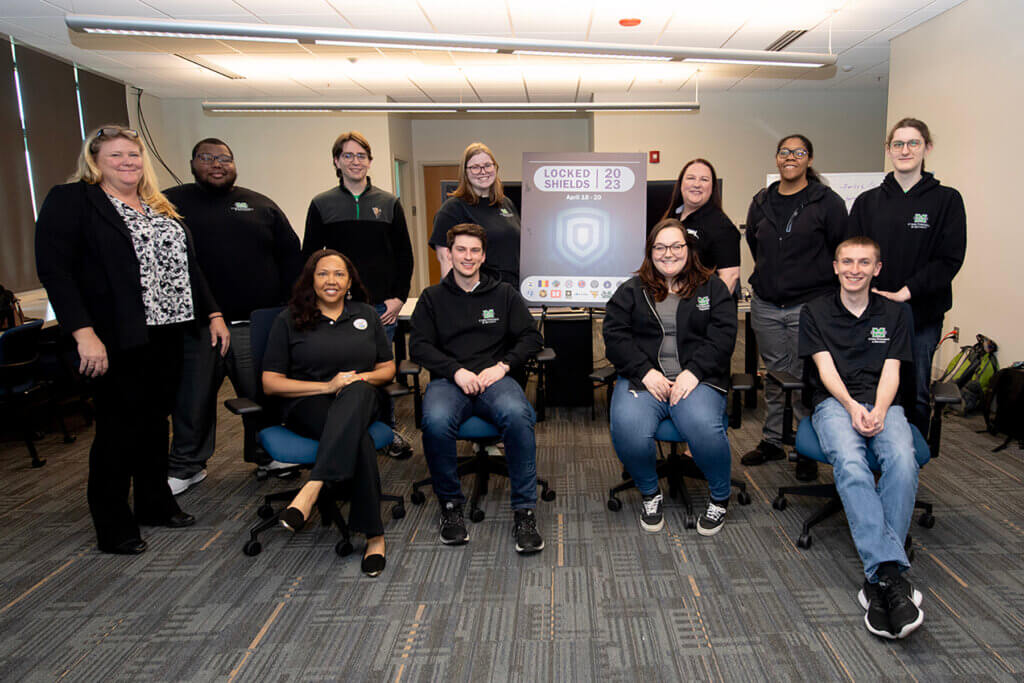Eight Marshall University students participated last month in the world’s largest international cyber defense exercise, run virtually by the NATO Cooperative Cyber Defence Centre of Excellence in Tallinn, Estonia. The students traveled to Morgantown to partner with the U.S. Blue Team for the exercise, hosted by the West Virginia National Guard, under the leadership of the Defense Information Systems Agency.
This was the second year that Marshall participated, along with students from West Virginia University, West Virginia Tech, the University of Hawaii, and the University of Maryland Global Campus. They joined 180 cyber experts and representatives from federal and state agencies taking on the role of a national cyber rapid reaction team deployed to assist the country in handling a large-scale cyber incident.
“In this exercise, our students get to team up with top-notch pros for a hands-on learning experience we cannot teach in the classroom,” said Bill Gardner, interim chair and undergraduate program director for cyber forensics and security.
The team was one of 24 Blue Teams from 28 countries joining in the friendly cyber competition in which they demonstrated their skills in reporting incidents, executing strategic decisions and solving forensic, legal and media challenges. Teams were graded on how well they protected their networks while following gameplay engagement rules.
Marshall students who participated included Jack McFee, A.J. Clark, Ethan Endes, Sam Adkins, Ezekiel Bennet, Emma Meadows, Hannah Carrol, and Jaslin Giron. All are students in Marshall’s Cyber Forensics & Security Program.
“We’re extremely grateful to the West Virginia National Guard and the Defense Information Security Agency for this tremendous opportunity for our students. Students applied what they’ve learned in our classrooms and labs under extremely realistic conditions,” said John Sammons, associate director of the Marshall University Institute for Cyber Security. “They also get valuable experience in teamwork, communications, and working under pressure.”
Marshall cyber student, Emma Meadows, explained that participating in Locked Shields was an incredible experience.
“The live-fire simulated environment was unlike anything I had ever encountered before, and it gave me an opportunity to apply the tools and techniques I learned in the classroom,” Meadows said. “Being able to put my skills to the test in such a realistic scenario was incredibly rewarding. I’d say one of my favorite parts was using tools that I discovered by participating in National Cyber League (NCL). Seeing the real-world application of participating in cyber competitions was really cool to me.”
According to student Jaslin Giron, working alongside experts was a tremendous opportunity and a valuable chance to sharpen the skills learned in the classroom.
“I was able to be more of help than I expected and help our team progress through the tasks. When I couldn’t help, I would watch the more experienced participants on how they completed the forensics section of the competition,” Giron said.
“During my participation in Locked Shields, I learned a lot about cyber defense tactics, techniques, and procedures,” Marshall student A.J. Clark said. “I gained experience in responding to attacks and understanding the complexities and challenges involved in coordinating a response to such attacks. I also learned about the importance of communication, collaboration, and teamwork in cyber defense operations.”
The West Virginia-led U.S. team finished 16th and accomplished several important measures during the exercise.
“There were a number of objectives we achieved by participating in Locked Shields 2023,” said Maj. Bill Keber, U.S. Blue Team lead for Locked Shields 2023. “First, we built interagency, intergovernmental and multinational cyber response relationships through the execution of this exercise. We also built a framework to share innovating and emerging cyber defense best practices and collaborated with the next generation of the cyber workforce through collegiate-level student involvement. Overall, I couldn’t be happier with how the exercise went this year and we look forward to improving our skills and competing in 2024.”
For more information about Marshall’s Institute for Cyber Security, visit https://www.marshall.edu/cyber/. To learn more about cyber security programs at Marshall, visit www.marshall.edu/cfs and https://www.marshall.edu/cecs/b-s-in-computer-and-information-security/.
###
Photo Caption:
Marshall students participated in Locked Shields 2023 in Morgantown with representatives from the Defense Information Systems Agency and other colleges.
Left to right, back row: Christie Richards (DISA), Ezekiel Bennett, Andrew Clark IV, Emma Meadows, Jennifer Augustine (DISA), Jaslin Giron and Sam Adkins.
Front row: Lisa Hines-Simmons (DISA), John McFee, Hannah Carroll and Ethan Endres.

